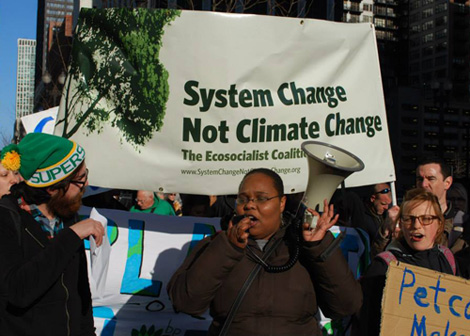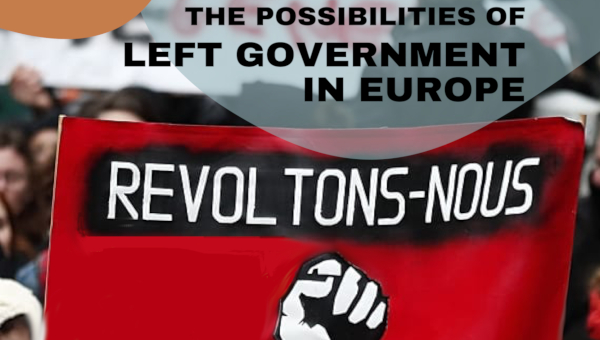There are two points of common agreement amongst almost all sections of the Left. We are in the midst of a fundamental turning point in the earth’s environment from climate change, with many catastrophic consequences unfolding, from species extinction to habitat loss to enormous obstacles and costs for human adaptation; and the Left remains, in almost all zones of the world, but especially in North America, on the margins as a social force in the face of a reconstructed and more authoritarian neoliberalism. How to respond in such a situation?
It has been common for anti-capitalist dissidents to begin from pointing out the social and ecological disasters accumulating from capitalist development, and from there move to a prediction of imminent breakdown of the system and an upsurge in political opposition and spontaneous socialist (or collectivist) consciousness. A mechanical political equation running something like this: growth dynamics tending to gross inequalities and disregard for ecology equals socio-ecological disaster equals emergent anti-capitalist movements equals alternative socialisms. The horrors of what capitalism is and what it does necessarily producing its own opposition.
But what counter-forces does the dynamics of capitalist development also spontaneously generate? How do the ruling classes and its state adapt? What political form might oppositional forces take? How will that opposition collectively determine its strategies and organize across space – from neighbourhoods, to cities to states to planetary collaborations? And, as Marx insisted, how will working-class people and other oppressed groups form the democratic capacities for the collective governance of an alternate social order? The ecological and social challenges of this political moment of permanent austerity and global warming poses very powerfully, the question of strategy. These challenges, it hardly needs saying, do not in themselves provide the answer.
Here, Brad Hornick and Sam Gindin take up some of these issues in response to Sam Gindin’s Bullet, “Unmaking Global Capitalism.”
On the Environmental Question,
Sam Gindin Has Got it Wrong
Brad Hornick
Sam Gindin’s recent contributions to the The Bullet and Jacobin explore the lost potential of the working-class in revolutionary politics. On the economic and ecological fronts, he argues, working-class politics has been incapable of catalyzing widespread and consequential societal mobilization, or becoming vital sites of theoretical and practical struggle.
 While generally a useful rehashing of Marxist categories, Gindin seems oblivious to the fact that a promising incipient mobilization of the working-class as-a-whole is well underway. The climate justice movement and particularly its more radical wing is a perfect example of an environmental working-class that is precisely about challenging capitalism “when it is working at its best.” Gindin’s arguments are as follows:
While generally a useful rehashing of Marxist categories, Gindin seems oblivious to the fact that a promising incipient mobilization of the working-class as-a-whole is well underway. The climate justice movement and particularly its more radical wing is a perfect example of an environmental working-class that is precisely about challenging capitalism “when it is working at its best.” Gindin’s arguments are as follows:
Workers have the incentive because of unfulfilled wants and, leverage because of place in production, to move society beyond capitalism. Broad mobilization to that end is hijacked however, by sectionalism and narrow economic militancy, as well as hierarchical and bureaucratic union organization.
At the same time, working-class agency is circumscribed by class fragmentation across workplaces and by income. “Absent a vision that encompasses the entire working-class,” explains Gindin “and absent the goal of developing workers’ capacity to democratize the economy and society, unions turned into instrumental organizations.”
This would explain why as capitalist crisis intensifies and austerity is imposed, capitalist class solidarity increases as worker solidarity diminishes rather than radicalizes. Capitalism produces contradictory and anti-systemic social forces (grave-diggers) that are contained because capitalism is resilient and capitalist class agency consistently outflanks worker solidarity.
An endemic feature of capitalism, periodic and cyclical crisis, is resolved by various strategies to revolutionize the means of production. Gindin’s “three legs of a powerful triad” – neoliberalism, financialization and globalization are but the latest manifestations, and while championed by their state “authors” they represent “capitalism getting its groove back.”
Working-class agency, for Gindin, is decidedly less groovy. Instead of identifying three major labour modes of capitalist grave-digging, he stresses three weaknesses that inhibit a commensurate “force” to challenge to its class enemies: economic and environmental “crisis-mongering,” avoiding the question taking state power, and an anarchic approach to social change rather than “building institutional capacities.”
Gindin’s reference to, then sidestepping of the ecological question is a first clue that something is amiss in his interesting juxtaposition of the class struggle between contending forces. While Marxism as a whole is leading an important ideological fight against climate change, some of its spokespeople are clearly laggards in understanding the relevance of a burgeoning ecosocialist movement.
When he argues we cannot evoke environmental catastrophism because we risk ‘immobilization’ he engages in the same fear-based psychologism of denial behind reactionary political solutions and utopian green capitalism.
Gindin is correct when he says political solutions are needed in response to the climate crisis and that there is a difference between purely spontaneous moments and a concerted movement. Issues related to the foundation of capitalist rule – wage labour, property, the market economy, commodity exchange, etc., are the hefty issues with which the environmental movement will have to come to terms. But voicing concerns for climate catastrophe that is symptomatic of these underlying structures should not be intentionally stifled.
Is There or Is There Not a Crisis?
The pressing question that must be sharply addressed is this: Is there or is there not a crisis? This question is important, because climate science points to a very severe timeline for action.
Some Marxist writers argue the planetary metabolic rift has set in motion a potentially irreconcilable trajectory of bio-physical processes which, according to climate science, is either presently, or soon will be impervious to subjective human intervention. This is matched by the persistence of underlying and causal socio-economic forces (i.e. capitalism) that also appear intractable, i.e. seem to have ‘life of their own’ beyond intentional influence.
Together, the two represent an historical crisis that is in danger of leading to final, terminal crisis of physical existence while at the same time revealing a crisis in the state of consciousness/subjectivity, which attempts, but is incapable of responding adequately in practice. What Gindin mildly calls “environmental catastrophism” is part of an essential articulation of this problematic.
It is the ‘scream’ that gives voice to a continuum identified in Marxist theory. Alienation of labour and nature is the same process. The logic of capital accumulation creates material estrangement of human beings from natural conditions of their existence – in relation to the alienation of soil nutrients, antagonism between town and country, in uneven/unequal production relations globally, in the connection between anthropogenic influences on the carbon cycle and, in the relationship between stochastic and stored energy. Capitalism promotes capital accumulation on never-ending and expanding scale that undermines natural thermodynamic equilibrium.
We already face a degree of material destruction of nature, and society/nature rift, requiring renewal on a deep and epochal scale and on a more universal level than has been hitherto imagined – at least on par with the great historical shift from feudalism to capitalism. In the face of terminal ecological crisis, the sum total of reforms required at all levels of society for permitting mere survival, argues Patrick Bond, would be so momentous, they would have revolutionary implications. If this is not a case for workers to engage in a ‘class-for-itself,’ I don’t know what is.
As J.S. Risbey argues, there is a difference between “alarmist” and “alarming” in connection to climate crisis. The former exaggerates a danger causing unwarranted panic and the latter is an appropriate response to objective reality. And as David Roberts argues, “if you’re not alarmed about climate, you aren’t paying attention.” Any debate questioning the notion of “alarmism” in connection to catastrophic climate change, he says, is surreal in the context of recent climate science.
The more appropriate question is what level of alarm is adequate or ‘commensurable’ to the problem we face.
I would argue that the level of alarm that is adequate is one that would forcefully suggest a messianic vision of a full-on ecosocialist working-class – environmentalist revolution with one of its central rhetorical devices being the warning of the ‘end of times.’ This call for changing everything is not made because it is easy, or because we “take the formidable power of resiliency of capitalism” without the appropriate level of gravity. The call is made because it is necessary.
Today’s Marxism must respond to this latent but exploding global existential concern for a sickening planet and mounting predictions of catastrophic positive feedbacks with which scientists are soberly talking of planetary doom.
The stark reality may in fact as Gindin argues, be initially de-mobilizing, because, as Suzanne Moser argues facing catastrophic climate change is like facing death. The very life support systems upon which humans depend, she says, are unravelling at scales and rates that will inevitably threaten deep-seated human insecurities. Accepting the implications of climate science is thus “akin to accepting one’s own mortality, maybe a doctor’s prognosis of one’s impending death, but on a much grander scale.”
To deal with it soberly requires a personal capacity to work through the five stages of denial, anger, bargaining, depression and acceptance. It is difficult personal and collective work on a societal level but a necessary contemporary compliment to Marx’s exhortation, the “ruthless criticism of the existing order, ruthless in that it will shrink neither from its own discoveries, nor from conflict with the powers that be.”
A new cultural zeitgeist evoking unspoken grief, despair and sense of loss of nature is surely today’s expression of Marx’s “sigh of the oppressed creature, the heart of a heartless world, and the soul of soulless conditions.” This is precisely the passion that needs to be rescued from metaphysics and put to the service of historical/materialist analysis and socialist political strategy.
Horizontal Politics
This brings us another of Gindin’s objects of critique.
Gindin’s dismissal of the “horizontal” politics of Occupy or the Battle of Seattle does a great disservice by contending that it somehow does not count as proper politics. To infer that “it’s a start but insufficient” as a politics of transformative change betrays a failure to learn from history (for instance, whether it is the early development of the Soviets, or the anarchist/socialist competition in Spain). It points to an academic Marxist chauvinism and a insensitivity to the more nuanced versions of Marxist dialectics and praxis.
There is a huge and apparently unrecognized working-class movement on-the-go out there that is genuinely revolutionary. One example is an upcoming People’s Climate March that promises to “change everything” and to “take a stand to bend the course of history.” The left’s inability to honour and integrate the contemporary working-class environmental movement’s “moments” debilitates the socialist movement as a whole and undercuts potential for mobilizing the traditions of revolutionary socialist history for today’s politics – reconfiguring our relationship to each other and to the ecosystem that sustains life.
The social justice, anarchist, labour, environmentalist, and first nation convergences that are part of what I would call the new ecosocialist movement is a sensational expression of a “vision that encompasses the entire working-class” rather than sectional interests. The radical demands to confront fossil fuel capitalism at the points of extraction, production and transportation are at the front lines of working-class politics and are a sharp corrective to a view of the working-class movement as a whole is immobilized. •
Brad Hornick is a Vancouver writer and Ph.D. student. He writes a regular blog on rabble.ca where this article first appeared. He is active in ecosocialistsvancouver.org, systemchangenotclimatechange.org and convergeforclimate.org.
Reply to Hornick: If Only…
Sam Gindin
All politics begins with an assessment of where we’re at. Hornick’s other-worldy assessment is, that “a promising incipient mobilization of the working-class-as-a-whole is well underway” and that the climate justice movement “is a perfect example of an environmental working-class that challenges capitalism.” If only. There are certainly impressive protests and budding movements here and there, and the environmental movement has brought new people and energy into politics. But the truth that Hornick refuses to acknowledge is the depth of the defeat labour suffered through the neoliberal period (i.e. since the early 1980s). In spite of a crisis no-one even tried to blame on labour, it is the labour movement that continues to be on the defensive; the banks are coming out of the financial crisis as strong as ever; social democratic parties are abandoning whatever was left of their ideals; ecosocialist politics remains a minority trend even within the environmental movement; and the socialist left has been unable to develop a form of organizing that can match what we are all up against. We’re losing, they’re winning.
Hornick attacks me for critically raising ‘catastrophism.’ Let me start with where we agree. We must, as Hornick says, start with the truth. If it is clear the world is going to end in 20 years, we should say so. What we should not, however, do is purposely exaggerate the possible timing of that end in the false hope that this will help mobilize people (just as we shouldn’t exaggerate our strength in the false hope that this will help build the movement). Though there may be disagreements on how many decades we still have, there is no disagreement between us over the fact that we face a grave environmental crisis, that even if the world survives for some time it will be a much uglier world to live in, and that inequality in terms of access to the environment may become this century’s greatest egalitarian issue.
Reversing Trends?
Whether we can reverse this trend depends on whether we can build the social and political force to do so. After citing the immediacy of what must be done, Hornick passionately proclaims “If that is not a case for workers to engage in a ‘class-for-itself’ struggle, I don’t know what is.” Well, workers had plenty of reasons to engage in a ‘class-for-itself struggle’ without the environmental threat, but that hardly guaranteed the emergence of an appropriate politics. Such a politics will take time because it means building the working-class (broadly defined) into a social force with the confidence to envision an alternative society and the institutions and capacities to actually get there.
Hornick is remarkably optimistic, given recent history here and abroad, about the ease of this coming to pass. He especially dislikes my questioning of the horizontal politics of Occupy, arguing that my attitude reflects “an academic Marxist chauvinism and a insensitivity to the more nuanced versions of Marxist dialectics and praxis.” That’s a mouthful (and not just because most of my working life wasn’t in academe). I actually praised Occupy for showing that audacious actions could touch a populist nerve and showing that a class analysis, even a crude one, could also influence the public dialogue. But I also maintained something that seems self-evident today and what I suspect a good number of those involved in Occupy also now agree with: this kind of symbolic politics is limited in its ability to do outreach and challenge power in a sustained way. To insist, as Hornick does, that such protests necessarily add up to a new politics isn’t dialectics or praxis but little more than a mechanical, rather unproblematic, religious assertion.
Environmentalists have admirably studied and publicized the threats we face. The really difficult challenge – after soberly assessing the existing balance of social forces – is how to build the structures that give people the collective confidence that change is really possible and that even ending capitalism is conceivable. We owe much in this regard to the work already being done by Hornick and others. But we need to be brutally honest about how far we still are from getting there. •





